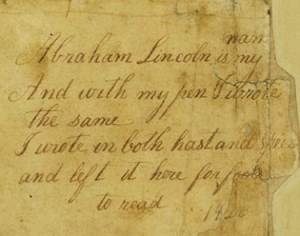Papers of Abraham Lincoln publishes all documents from Lincoln’s first 33 years
News Release
April 19, 2018
Christopher Wills
217-558-8970
chris.wills@illinois.gov
New resource for studying Lincoln’s life
Papers of Abraham Lincoln publishes all documents from Lincoln’s first 33 years
SPRINGFIELD – From childhood scribblings to a legislative protest against slavery, all Abraham Lincoln documents from his first three decades are now available online to scholars, teachers and history buffs around the world, thanks to the Papers of Abraham Lincoln project.
This first release of documents is a major step toward the Abraham Lincoln Presidential Library and Museum’s goal of providing a transcript of every single document written by or to Lincoln, complete with helpful annotations and supporting information.
“This project has the potential to transform Lincoln scholarship,” said Alan Lowe, executive director of the Abraham Lincoln Presidential Library and Museum. “Not only will researchers have immediate access to what President Lincoln wrote himself, but they’ll also be able to see what others were telling him.How did he navigate conflicting demands and make decisions? Now this information will all be in one place for students and scholars around the world.”
The presidential library’s Papers of Abraham Lincoln project has spent years searching the world for Lincoln-related documents, and then transcribing and annotating them. Now the project has begun releasing its work at www.PapersofAbrahamLincoln.org, a “beta” site that will be tweaked and improved as user feedback comes in.
This first wave, covering the period from his birth in 1809 birth to the end of his legislative career in 1842, contains 340 documents written by or to Lincoln. It also includes 4,839 documents that provide context on what issues Lincoln faced as a lawyer and legislator.
The oldest document is a small workbook Lincoln used as a student. It shows him learning to subtract, multiply, divide, calculate interest and more. The young Lincoln also jotted down silly comments and poems, including
Abraham Lincoln is my nam[e]
And with my pen I wrote the same
I wrote in both hast[e] and speed
and left it here for fools to read
Over the years, the “ciphering book” was taken apart and its 11 pages were given to different people and institutions. The standard reference on Lincoln’s writings contained only part of the workbook’s contents. The version offered by the Papers of Abraham Lincoln combines all 11 pages so that the workbook’s complete text is now available – an example of the project’s goal of gathering all Lincoln documents in one place.
Other documents cover both Lincoln’s personal and professional life – his attempts to find a profession in New Salem, his early legal work, his failed relationship with Mary Owens and his successful one with Mary Todd. The bulk of this release deals with his time in the Illinois legislature. Researchers can read bills Lincoln wrote, speeches he delivered and open letters he published in the newspaper.
“This is the most complete documentary collection ever produced on the first 33 years of Lincoln’s life. It undoubtedly will allow scholars to reassess Lincoln’s political beginnings,” said Illinois State Historian Samuel Wheeler, acting director of the Papers of Abraham Lincoln. “Future releases on other periods in his life will also set new standards, allowing for even more new insights and discoveries.”
Valuable Lincoln resources can already be found online, but they have limitations. The Collected Works of Abraham Lincoln gets its content from a 1953 collection and does not include documents written to Lincoln. A Library of Congress site features only documents in the library’s collection – roughly 40,000 items.
When the Papers of Abraham Lincoln project is complete, it will include 150,000 to 175,000 documents.
Today’s debut follows an intensive process to improve the Papers of Abraham Lincoln project’s policies and procedures, assisted by a team of national experts and with tremendous guidance from Susan Perdue, the co-author of “A Guide to Documentary Editing.”
Many organizations have helped make this project possible, including the Abraham Lincoln Association, Abraham Lincoln Bicentennial Foundation, Abraham Lincoln Presidential Library Foundation, Shelby Cullom Davis Charitable Fund, National Endowment for the Humanities, National Historical Publications and Records Commission, Shapell Manuscript Foundation, Jean and Bill Soman, and Tracy Community Foundation.
Iron Mountain Inc. provided both financial and in-kind support, and today stores the detailed images of documents scanned by the Papers of Abraham Lincoln in a secure data storage facility.
“We’re proud to support the legacy of Abraham Lincoln and act as the archival partner to the Papers of Abraham Lincoln project,” said Ty Ondatje, senior vice president, Corporate Responsibility and Chief Diversity Officer, Iron Mountain. “President Lincoln was one of the most prolific presidents, and documents written from him, or to him, help tell the story of our country during an important era in history. Iron Mountain’s Iron Cloud is committed to protecting and preserving a copy of those documents and thus ensuring they are accessible through the library for generations to come.”
The presidential library and museum uses a combination of rigorous scholarship and high-tech showmanship to immerse visitors in Lincoln’s life and times. Visitors can see ghosts come to life on stage, watch TV coverage of the 1860 Presidential election, roam through the Lincoln White House, experience booming cannons in a Civil War battle and come face to face with priceless original Lincoln artifacts.
The library holds an unparalleled collection of Lincoln books, documents, photographs, artifacts and art, as well as some 12 million items pertaining to all aspects of Illinois history.
For more information, visit www.PresidentLincoln.illinois.gov. You can follow the ALPLM on Facebook,Twitterand Instagram.
